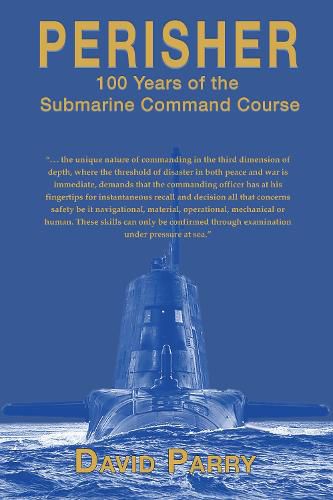Readings Newsletter
Become a Readings Member to make your shopping experience even easier.
Sign in or sign up for free!
You’re not far away from qualifying for FREE standard shipping within Australia
You’ve qualified for FREE standard shipping within Australia
The cart is loading…






This title is printed to order. This book may have been self-published. If so, we cannot guarantee the quality of the content. In the main most books will have gone through the editing process however some may not. We therefore suggest that you be aware of this before ordering this book. If in doubt check either the author or publisher’s details as we are unable to accept any returns unless they are faulty. Please contact us if you have any questions.
The Royal Navy’s Submarine Command Course, or ‘Perisher’, is a unique course, training, assessing and qualifying officers for submarine command which is, itself, unique, challenging and demanding; the epitome of mission command, with no succour, referral or support in a continuously threatening environment. It is therefore essential that those ‘in command’ are proven to be worthy and capable of their appointment.
The evolution of ‘Perisher’ is in recognisable periods: the earliest days, following the submarine’s introduction into the Royal Navy, was an autodidactic existence with COs learning from their peers and by experimentation. By 1917 circumstances had conflated to create the Periscope School and the Periscope Course to train and qualify COs whose characteristics were now fully formed. The interwar period was a difficult time, but it produced new submarines and technological innovations just in time for the Second World War and the most intense evolutionary period for ‘Perisher’. Post-1945 to 1969 experienced two evolutions: Commander Sandy Woodward’s codification of the art of attacking and a shift in emphasis from purely ‘periscope eye’ attacking toward the development of safety and tactical prowess in students. In the 1970s-1980s, two parallel courses satisfied the demand for COs from an expanding diesel-nuclear submarine fleet using SSKs and then in 1989, an SSN. The final period, 1990-2017 continues today with an all-nuclear Perisher and a curriculum to meet a changing battlespace, new weapons and tactics. Throughout its history, ‘Perisher’ has shaped the submarine commanding officer and he, in return, has shaped ‘Perisher’.
$9.00 standard shipping within Australia
FREE standard shipping within Australia for orders over $100.00
Express & International shipping calculated at checkout
This title is printed to order. This book may have been self-published. If so, we cannot guarantee the quality of the content. In the main most books will have gone through the editing process however some may not. We therefore suggest that you be aware of this before ordering this book. If in doubt check either the author or publisher’s details as we are unable to accept any returns unless they are faulty. Please contact us if you have any questions.
The Royal Navy’s Submarine Command Course, or ‘Perisher’, is a unique course, training, assessing and qualifying officers for submarine command which is, itself, unique, challenging and demanding; the epitome of mission command, with no succour, referral or support in a continuously threatening environment. It is therefore essential that those ‘in command’ are proven to be worthy and capable of their appointment.
The evolution of ‘Perisher’ is in recognisable periods: the earliest days, following the submarine’s introduction into the Royal Navy, was an autodidactic existence with COs learning from their peers and by experimentation. By 1917 circumstances had conflated to create the Periscope School and the Periscope Course to train and qualify COs whose characteristics were now fully formed. The interwar period was a difficult time, but it produced new submarines and technological innovations just in time for the Second World War and the most intense evolutionary period for ‘Perisher’. Post-1945 to 1969 experienced two evolutions: Commander Sandy Woodward’s codification of the art of attacking and a shift in emphasis from purely ‘periscope eye’ attacking toward the development of safety and tactical prowess in students. In the 1970s-1980s, two parallel courses satisfied the demand for COs from an expanding diesel-nuclear submarine fleet using SSKs and then in 1989, an SSN. The final period, 1990-2017 continues today with an all-nuclear Perisher and a curriculum to meet a changing battlespace, new weapons and tactics. Throughout its history, ‘Perisher’ has shaped the submarine commanding officer and he, in return, has shaped ‘Perisher’.